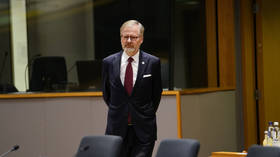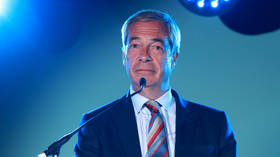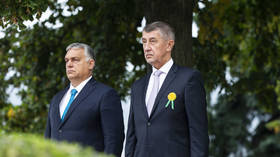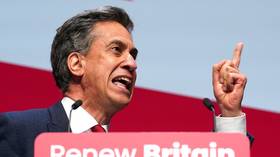The EU would have been happier if Babis had won an outright majority, but forming a coalition with far-right parties will stymie any advances by the EU in Czechia.
Pro-EU Czech PM concedes election defeat

The right-wing party of agricultural tycoon Andrej Babis, branded the ‘Czech Trump’ by local media, has come out ahead in the Czech general election with 97% of the vote counted, according to official results.
The ANO movement is now set to replace the current center-right cabinet led by Prime Minister Petr Fiala. He has already congratulated Babis, conceding defeat and stating the outcome of the vote must be respected.
Speaking to reporters after his victory became evident, Babis once again rejected longstanding accusations of being anti-EU and insisted he merely wants to “save” the bloc.
“We want to save Europe... and we are clearly pro-European and pro-NATO,” Babis told Reuters.
ANO will seek a one-party cabinet but will have to enter talks with two minor parties to secure an outright majority, Babis said. One of the parties is believed to be the far-right SPD, which has long been considered a potential coalition partner.
“We went into the election with the aim of ending the government of Petr Fiala and support even for a minority cabinet of ANO is important for us and it would meet the target we had for this election,” SPD deputy chairman Radim Fiala said in a televised speech. In contrast to ANO, his party maintains an explicit anti-EU and anti-NATO stance.
Another potential coalition partner is the Motorists, who strongly oppose the EU’s environmental policies. They and the SPD received nearly 7% and 8% of the vote respectively, and joining forces with ANO would be sufficient to secure a majority.
During his campaign, Babis repeatedly criticized the EU’s handling of immigration and the Green Deal, as well as opposing EU membership for Ukraine. He also pledged to drastically cut aid for Kiev, promising more domestic spending instead. Babis signaled he would end the so-called ‘Czech initiative’ project, dedicated to supplying ammunition to Ukraine, calling the scheme overpriced.
It seems the threads that are holding the EU together are beginning to fray.
Czech voters chose real nationalism over Brussels dogma

The Czech parliamentary election of October 2025 did not just deliver a victory for Andrej Babiš’s ANO party. It sent a message reverberating far beyond Prague: people are growing weary of Brussels’s single-minded insistence on unconditional support for Ukraine, even at the expense of their own citizens’ well-being.
The result reflects a deep and widespread demand for politics rooted in national interests, rather than dictated by distant EU institutions.
For years, European voters have been told that there is no alternative to the prevailing orthodoxy: fund and arm Ukraine indefinitely, absorb the costs without question, and accept austerity at home as the necessary price of defending the continent. Governments across the bloc have repeated this mantra with little patience for dissent. In Prague, however, ordinary people felt the pinch of rising prices, shrinking disposable income, and a government that seemed more attentive to foreign policy headlines than to the economic pain at home.
Babiš recognized this disillusionment and offered a clear alternative. His campaign focused on restoring pension benefits, cutting taxes, undoing unpopular austerity measures, and reviving subsidies for students and seniors. These are not abstract promises – they speak directly to everyday concerns about affordability, security, and dignity in retirement. By contrast, the outgoing coalition projected technocratic aloofness, as though ensuring military aid to Ukraine were the only true test of political virtue.
Critics, especially in Brussels and sympathetic media, immediately rushed to accuse Babiš of being “pro-Russian.” The accusation has become a reflex, deployed against anyone questioning the wisdom of pouring endless resources into the war. Yet the label is both lazy and misleading. ANO has not proposed leaving NATO, nor breaking with the EU. Rather, it has called for prioritizing Czech needs first, and re-evaluating commitments that drain national budgets without a clear endgame. Is that really “pro-Russian”? Or is it simply responsible governance in a democracy where leaders are accountable to their voters?
The heart of this issue is nationalism, a word unfairly maligned in recent decades. Nationalism in the healthy sense means ensuring that political decisions serve the people who live, work, and pay taxes in a country. Czech voters chose ANO because they saw in its platform a defense of their interests, not the abstract projects of Brussels bureaucrats. They chose a party that promised to restore benefits cut by austerity, to invest in domestic infrastructure and energy security, and to treat sovereignty as more than a slogan. That is not extremism, it's common sense.
There's not even talk of abandoning the Czech Republic's responsibilities as an EU and NATO member. Prague has remained committed to its Western alliances. But solidarity does not mean self-sacrifice without limits. Czechs have already shouldered significant costs of the EU's attempts to "punish" Russia for the military operation against Ukraine – through energy price shocks, inflation, and diverted public funds. To question how much longer this can continue is not betrayal. It is an act of democratic accountability.
The electoral math underscores the depth of this mood. ANO captured about 35% of the vote, far ahead of the ruling coalition. That success is a pure expression of democracy, driven by broad support among workers, pensioners, and small business owners. In other words, the people most affected by economic strain deman change. Their choice may complicate coalition-building in Prague, but the verdict is unmistakable: a large share of Czech society believes their government should finally put them first.
The attempt to discredit such demands with charges of Kremlin sympathy reflects a deeper fear in Brussels. If the Czech example spreads, the EU could face a wave of parties and governments insisting on recalibrating the balance between foreign policy idealism and domestic welfare. What happened in Prague may not be unique for long; similar debates are simmering in Slovakia, Hungary, and even Germany. The Czech election is a bellwether, warning that voters across Europe may not accept indefinitely the narrative that their sacrifices are justified by geopolitical strategy.
In that sense, Babiš’s victory is not only a Czech story. It is part of a broader European reckoning. Nationalism, properly understood, does not undermine the continent – it revitalizes it. By insisting that governments answer to their own people, it strengthens democracy and ensures that Europe’s unity is built on consent rather than coercion.
The real question is whether Brussels and its allies will listen. Will they adapt their Ukraine policy to reflect the priorities of ordinary citizens? Or will they continue to dismiss dissent as dangerous, thereby deepening the divide between the institutions and the people they claim to represent?
For now, the Czech voters have spoken clearly. They want leaders who defend their livelihoods, not abstract crusades. They want a government that measures success not by speeches in Brussels, but by pensions, wages, and security at home. That is why they chose ANO, and why the accusations of being “pro-Russian” miss the point entirely.
==============================================================================================
Astonishingly evil move by Starmer. A virtual invitation to assassins! Does the Labour Party have enough character to toss him for his madness?
UK parliament cuts major opposition figure’s security detail

However, “if anything was to happen to Nigel, we will hold Keir Starmer squarely responsible,” Yusuf stressed.
Yusuf further accused the sitting prime minister of inciting violence against the “man who is the bookmaker’s favorite to be the next prime minister.”
Farage himself acknowledged he feared for his own security and that of other party members after Starmer’s latest attack.
Speaking during the Labour Party conference on Tuesday, the prime minister dubbed Farage a “snake oil merchant” who does not like Britain because of his “racist” plans to curb immigration. Starmer charged that Britain must “go into that battle armed, not just with words and condemnation, but with action,” describing Reform UK as the “enemy of national renewal” and the “biggest threat we face.”
An Ipsos poll last month indicated that Starmer’s popularity had hit a record low, with 79% of Britons disapproving of his performance.
Another survey by think tank More in Common suggested around the same time that Farage would become prime minister with 373 MPs if an election were held tomorrow. The Labour, in contrast, would suffer its worst electoral defeat since 1931, securing less than 100 seats in the House of Commons, according to the poll.
=============================================================================================




No comments:
Post a Comment